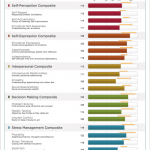EQ-i Scores—and not just low ones—can be shocking at first The first time I took the EQ-i, I was excited to get my report. I had worked in the field a while—trained, keynoted and written a few books. I was going to blow this thing away. I got the report via e-mail, and when I looked at it, I was
EQ Surprise #2 – Forget Your Emotional Intelligence Scores
Scores are Overrated “My Assertiveness score is 112. My Emotional Intelligence beats yours by 7 points,” or “Last time I took the EQ-i, I got an Independence score of 95. Next time it’s going to be higher.” Too often EQ-i users get hooked by their scores, and by so doing, miss the fruit that
EQ Surprise #1 — There is no Emotional Intelligence on a Desert Island
Emotional Intelligence Needs a Comparison “I have low Empathy, but my Assertiveness is high.” This statement only makes sense when I compare my Emotional Intelligence—my social behavior—to others around me. In fact, comparison with others is the only thing that gives EQ any meaning at
Flexibility, Resilience and the Senior Executive Service
In my last post I shared the strong connection between EQ (Emotional Intelligence) and the core competencies we expect in our Senior Executive Service (the ECQs). In this post I’ll take a closer look at how we can take an EQ approach to developing a couple of those ECQs-- Flexibility, Resilience
Emotional Intelligence & the Senior Executive Service
The EQ-i 2.0 (Emotional Intelligence assessment) is an OKA favorite for developing established or aspiring members of the Senior Executive Service (SES). We like the EQ-i 2.0 because of the underpinning science of the assessment and the way in which the data and framework nicely support growth





